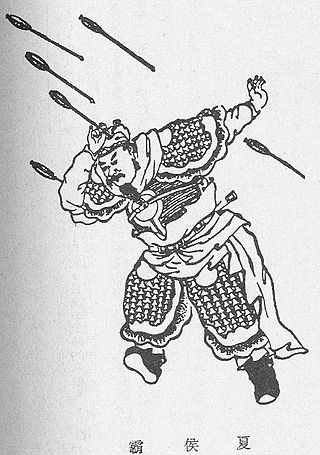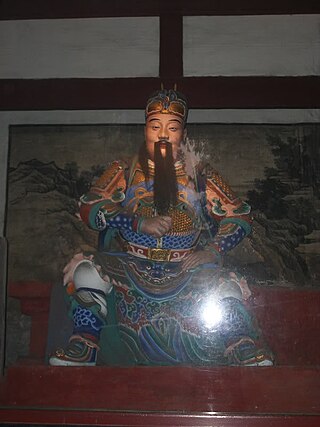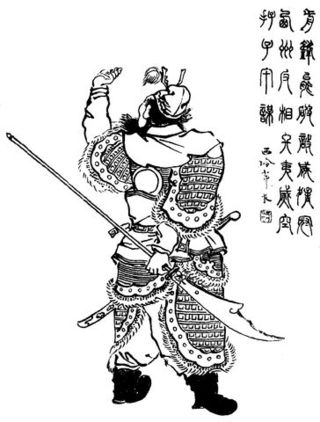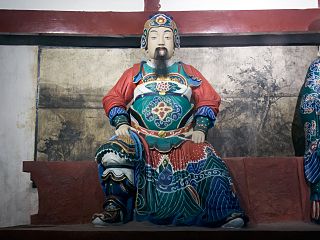Related Research Articles

Jiang Wei, courtesy name Boyue, was a military general of the state of Shu during the Three Kingdoms period of China. Born in Ji County, Jiang Wei started his career as a military officer in his native Tianshui Commandery, which was a territory of Wei. In 228, when Wei's rival state Shu launched an invasion led by Zhuge Liang, Jiang Wei was distrusted by Ma Zun, then administrator of Tianshui Commandery. As such, Jiang Wei had to defect to Shu. Zhuge Liang, the Imperial Chancellor and regent of Shu, highly regarded Jiang Wei and appointed him as a general in Shu. After Zhuge Liang's death in 234, Jiang Wei continued serving as a military commander during the regencies Jiang Wan and Fei Yi, eventually rising to the highest military rank of General-In-Chief (大將軍) after Fei Yi's death in 253. Between 240 and 262, he continued Zhuge Liang's legacy of waging war against Wei by leading another 11 military campaigns. However, Jiang Wei's campaigns were relatively constrained in terms of both scale and duration due to Shu's limited resources and inadequate food supplies, as well as internal political faultlines. In 263, when Wei launched a massive invasion of Shu, Jiang Wei led Shu forces to resist the invaders at Tazhong, Yinping and Jiange, himself defending Jiange which was under Zhong Hui's attack. While Jiang Wei managed to temporarily stall Wei's main force led by Zhong Hui, Deng Ai, another military commander of Wei, took a shortcut via Yinping and showed up at Chengdu unexpectedly. Liu Shan surrendered to Deng Ai without putting up resistance and ordered Jiang Wei to surrender to the Wei general Zhong Hui; this event marked the end of Shu's existence. In the following year, Jiang Wei instigated Zhong Hui to launch a rebellion in Chengdu against the Wei regent Sima Zhao and hoped to use the opportunity to gain military power and restore Shu. However, some of Zhong Hui's officers were unwilling to participate in the rebellion and started a mutiny, killing Jiang Wei and Zhong Hui.

Xiahou Ba, courtesy name Zhongquan, was a Chinese military general of the state of Cao Wei in the Three Kingdoms period of China. He was the second son of Xiahou Yuan, a prominent general who served under Cao Cao, the warlord who laid the foundation for the state of Cao Wei. Around 249, Xiahou Ba defected to Wei's rival state, Shu Han, after the regent Sima Yi seized power in a coup d'état. He died sometime between 255 and 259.

Liao Hua, courtesy name Yuanjian, originally named Liao Chun, was a military general of the state of Shu Han during the Three Kingdoms period of China. Like Zhang Yi and Zong Yu, Liao was one of few officials who served the Shu-Han state throughout its entire existence.

Wei Yan, courtesy name Wenchang, was a Chinese military general and politician of the state of Shu Han during the Three Kingdoms period of China. Originally a subordinate of the warlord Liu Bei in the late Eastern Han dynasty, Wei Yan rose through the ranks and became a general when Liu Bei seized control of Yi Province in 214. His performance in battle helped him to become a prominent figure in the Shu military in a short period of time. He was later appointed as the Administrator of Hanzhong Commandery and as an Area Commander in 219. Between 228 and 234, he participated actively in the Northern Expeditions led by the Shu regent Zhuge Liang against Shu's rival state, Cao Wei. After Zhuge Liang's death in c.September 234, Wei Yan was killed by another Shu general, Ma Dai, for alleged treason.

Pang De, courtesy name Lingming, was a Chinese military general who lived during the late Eastern Han dynasty. He started his career under the warlord Ma Teng, who was based in Liang Province. In 211, Ma Teng's son Ma Chao, along with a coalition of warlords from Liang Province, started a rebellion against the Han central government, which was controlled by the warlord Cao Cao. After Cao Cao defeated Ma Chao and the coalition at the Battle of Tong Pass, Ma Chao fled to Hanzhong Commandery and took shelter under the warlord Zhang Lu. Pang De accompanied him to Hanzhong. When Ma Chao defected from Zhang Lu's side in order to join the warlord Liu Bei, Pang De remained in Hanzhong and eventually came to serve Cao Cao after Cao Cao defeated Zhang Lu at the Battle of Yangping and took over Hanzhong. In 219, Pang De fought at the Battle of Fancheng under Cao Ren's command against Liu Bei's forces led by Guan Yu. Pang De was captured in battle and eventually executed by Guan Yu when he refused to surrender.
Lady Wu, personal name unknown, was a Chinese noble lady, aristocrat and posthumously honoured as Empress of Eastern Wu state. She was the wife of the warlord Sun Jian, who lived during the late Eastern Han dynasty of China. She bore Sun Jian four sons and a daughter – Sun Ce, Sun Quan, Sun Yi, Sun Kuang and Lady Sun. She was posthumously honoured as Empress Wulie in 229 by her second son Sun Quan, who became the founding emperor of the state of Eastern Wu in the Three Kingdoms period.

Ma Dai was a Chinese military general of the state of Shu Han during the Three Kingdoms period of China. He previously served under his uncle Ma Teng, a warlord in northwestern China, during the late Eastern Han dynasty. After Ma Teng's death, he followed his cousin Ma Chao and they joined the warlord Zhang Lu in Hanzhong for a short period of time. Ma Chao later defected to another warlord Liu Bei, and Ma Dai accompanied him. Ma Dai served under Liu Bei and later in the state of Shu Han.

Cao Zhen, courtesy name Zidan, was a military general of the state of Cao Wei during the Three Kingdoms period of China. He was an adopted son of Cao Cao, a warlord who rose to power in the late Eastern Han dynasty and laid the foundation for Wei. After Cao Cao's death and the end of the Eastern Han dynasty, Cao Zhen served under Cao Pi and Cao Rui, the first two emperors of Wei. He is best known for leading a successful defence of Wei from the first two of a series of invasions by Wei's rival state, Shu Han, between 228 and 229.

Wang Ping, courtesy name Zijun, was a military general of the state of Shu Han in the Three Kingdoms period of China. Originally a military officer serving under the warlord Cao Cao in the late Eastern Han dynasty, in 218 he defected to Cao Cao's rival Liu Bei, who later became the founding emperor of Shu, during the Hanzhong Campaign. Though he was a talented orator, Wang Ping never learned to read because he joined the army at a young age. Yet he did not let this disadvantage stop him and had his clerk help him with his reports. Known for his self discipline, he steadily rose through the ranks to become a senior general. During his career, he defeated Zhang He, quelled Wei Yan's alleged rebellion and was the leading commander of the Shu forces during the Battle of Xingshi. The highest position he reached was Senior General Who Guards the North (鎮北大將軍).
Guo Huai, courtesy name Boji, was a military general of the state of Cao Wei during the Three Kingdoms period of China. He started his career towards the end of the Eastern Han dynasty under the warlord Cao Cao as a subordinate of Cao Cao's generals Xiahou Yuan and Zhang He. During the Three Kingdoms period, he served in Wei, the state established by Cao Cao's son Cao Pi, and lived through the reigns of four Wei emperors. From the 220s until his death in 255, he governed and defended Wei's western borders in Yong and Liang provinces. During this time, he resisted multiple invasions by Wei's rival state, Shu Han, and quelled some rebellions by local Qiang, Di and other non-Han Chinese tribes.

Zhuge Shang was a military officer of the state of Shu Han in the Three Kingdoms period of China. He was the eldest son of the Shu general Zhuge Zhan and a grandson of Zhuge Liang, the first Chancellor of Shu.

Deng Zhi, courtesy name Bomiao, was a government official, diplomat and military general of the state of Shu Han during the Three Kingdoms period of China. A descendant of Deng Yu, Deng Zhi started his career in the late Eastern Han dynasty under the warlord Liu Bei as a low-level officer in Pi County. After Liu Bei discovered his talent, Deng Zhi steadily rose through the ranks to become a county prefect and later a commandery administrator and imperial secretary. In 223, the Shu regent Zhuge Liang sent him as Shu's envoy to meet Sun Quan, the ruler of Shu's ally state Wu, and reestablish the Wu–Shu alliance against their common rival state Wei. Deng Zhi succeeded in his mission and earned praise from Sun Quan for strengthening Wu–Shu ties. In 227, Deng Zhi became a military general and he participated in the first Shu invasion of Wei by leading a decoy force with Zhao Yun to distract the Wei general Cao Zhen. Although they lost the battle, Deng Zhi and Zhao Yun managed to rally their troops to put up a firm defence during their retreat and minimise their losses. Following Zhuge Liang's death in 234, Deng Zhi rose to higher general ranks and was stationed in present-day Chongqing for about 10 years before he was recalled back to the Shu capital Chengdu in his 70s to serve as General of Chariots and Cavalry. In 248, he suppressed a rebellion in Fuling. He died in 251.
Wu Ban, courtesy name Yuanxiong, was a Chinese military general of the state of Shu Han in the Three Kingdoms period of China.

Zhang Ni, courtesy name Boqi, rendered also as Zhang Yi, was a military general of the state of Shu Han during the Three Kingdoms period of China. Famous for his courage and generosity, Zhang Ni made his name known while rescuing a magistrate's wife from bandits and leading her to safety.

Zhang Yi, courtesy name Bogong, was a military general of the state of Shu Han during the Three Kingdoms period of China. Born in the late Eastern Han dynasty, Zhang Yi was a 10th-generation descendant of Zhang Liang. He started his career as a scribe under the warlord Liu Bei, who founded Shu later, and gradually rose to the positions of a county prefect and commandery administrator. In the early 230s, he served as an area commander tasked with maintaining the peace in Shu's southern commanderies. In 234, he led the Shu vanguard during the Battle of Wuzhang Plains against Shu's rival state Wei. From 238 to 259, Zhang Yi steadily rose through the ranks to become one of Shu's top generals. During this time, although he strongly opposed the Shu general Jiang Wei's aggressive stance towards Wei, he still accompanied Jiang Wei on his military campaigns against Wei. In 263, he surrendered to Wei forces along with the Shu emperor Liu Shan when Wei launched a large-scale invasion of Shu. In the following year, Zhang Yi was killed by mutineers during a rebellion by the Wei general Zhong Hui. Like Liao Hua and Zong Yu, Zhang was one of few officials who served the Shu-Han state throughout its entire existence.
Jiang Wei's Northern Expeditions refer to a series of eleven military campaigns launched by the state of Shu Han against its rival state, Cao Wei, between 240 and 262 CE during the Three Kingdoms period in China. The campaigns were led by Jiang Wei, a prominent Shu general. Unlike the previous Northern campaigns led by Zhuge Liang, which added Wudu and Yinping commanderies to Shu Han state territories, Jiang Wei's campaigns ended up being unpopular in both the military and civil circles in Shu. Also unlike Zhuge Liang's campaigns which often featured 60,000 to sometimes even 100,000 Shu Troops, Jiang Wei's were often much smaller rarely exceeding 30,000 even after the death of Fei Yi, where Jiang Wei assumed control of the military. The Zhuge Liang campaigns did suffer from logistical and supply issues for their large army. Zhuge's successor Jiang Wan, believed that it was the Hanzhong's mountainous terrain itself that were to blame for the campaigns failures and attempted to switch the route thru the Han river. Fei Yi, who succeeded Jiang Wan, agreed, and never allowed any large campaigns to be launched by Hanzhong. Jiang Wei however overlooked these concerns and used Hanzhong as his home base as Zhuge Liang did.

The Conquest of Shu by Wei was a military campaign launched by the dynastic state of Cao Wei against its rival Shu Han in late 263 during the Three Kingdoms period of China. The campaign culminated in the fall of Shu Han and the tripartite equilibrium maintained in China for over 40 years since the end of the Eastern Han dynasty in 220. The conquest laid the foundation for an eventual reunified China under the Western Jin dynasty in 280.
Zong Yu, courtesy name Deyan, was a military general and diplomat of the state of Shu Han during the Three Kingdoms period of China. Like Liao Hua and Zhang Yi, Zong was one of few officials who served the Shu-Han state throughout its entire existence.
The Battle of Dongkou was a naval battle fought between October 222 and January 223 between forces of the state of Cao Wei and the Kingdom of Wu during the Three Kingdoms period of China. The battle concluded in a Wu victory.
References
- Chen, Shou (3rd century). Records of the Three Kingdoms (Sanguozhi).
- Luo, Guanzhong (14th century). Romance of the Three Kingdoms (Sanguo Yanyi).
- Pei, Songzhi (5th century). Annotations to Records of the Three Kingdoms (Sanguozhi zhu).